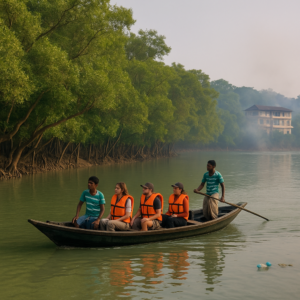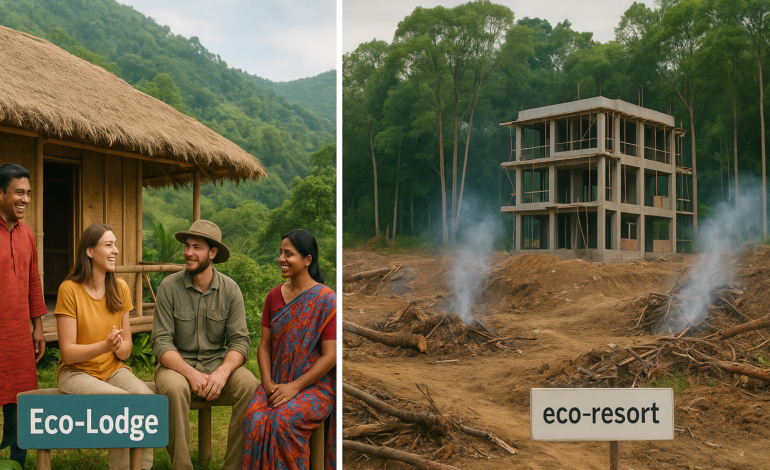Eco-Tourism in Bangladesh: A Sustainable Future or Just Clever Marketing?
Eco-tourism has emerged as a significant trend in Bangladesh, a country rich in natural beauty and cultural diversity. From the serene Sundarbans mangroves to the picturesque hills of Sajek Valley, Bangladesh offers a plethora of destinations that appeal to environmentally conscious travelers. The government’s commitment to sustainable tourism is evident through initiatives like the 25-year Tourism Master Plan and projects such as “Otithi,” aimed at promoting community-based tourism.
However, as eco-tourism gains momentum, concerns about greenwashing, where entities falsely portray their practices as environmentally friendly, have surfaced. This blog delves into the current landscape of eco-tourism in Bangladesh, examining its promises and the challenges posed by greenwashing.
The Promise of Eco-Tourism in Bangladesh
As Bangladesh moves toward sustainable development, eco-tourism is emerging as a powerful tool for protecting the environment and improving local livelihoods. With government plans and community-driven initiatives underway, the country is focusing on tourism that values nature, supports local people, and strengthens the national economy with both promise and complexity.
Government Initiatives and Master Plans
The government of Bangladesh has increasingly recognized eco-tourism as a key factor in achieving sustainable development goals. To harness this potential, the government introduced a comprehensive 25-year Tourism Master Plan that envisions raising the tourism sector’s contribution to the national economy to 4.77 billion US dollars by the year 2041. This plan prioritizes three main areas: eco-tourism, heritage tourism, and tourism related to meetings, incentives, conferences, and exhibitions, known as MICE tourism. The emphasis on eco-tourism reflects the government’s commitment to balancing economic growth with environmental protection and cultural preservation.
One flagship initiative under this plan is the “Otithi” project, which is a partnership between the Bangladesh Tourism Board and BRAC, one of the largest development organizations in the country. Launched in September 2024, Otithi focuses on community-based and environmentally friendly tourism. It encourages local communities to actively participate by sharing their unique cultural traditions and natural landscapes with visitors. At the same time, the project promotes environmental conservation by involving these communities in protecting their surroundings.
Community-Based Tourism (CBT) Success Stories
Community-Based Tourism, or CBT, has emerged as an effective way to involve local populations directly in the tourism economy while promoting sustainability. In places like Baishari, a village in the Bandarban district known for its scenic beauty, CBT programs have led to tangible improvements in local livelihoods. Supported by international organizations such as the United Nations Development Program and the Bangladesh Tourism Board, community members have received training in hospitality, customer service, and managing tourism activities.
These programs have empowered women to produce and market traditional handicrafts, creating new income streams and promoting cultural heritage. Young people have become active promoters of local attractions using social media platforms, helping to raise awareness and attract more visitors. This community involvement not only improves visitor experience but also strengthens social cohesion and pride among residents.
Environmental and Economic Benefits
Eco-tourism offers significant benefits both for the environment and local economies. For example, the Sundarbans, the largest mangrove forest in the world, serves as a prime location where eco-tourism has been used as a tool for environmental conservation. By attracting responsible tourists who appreciate the delicate ecosystem, eco-tourism generates revenue that supports conservation projects and raises awareness about protecting the area’s unique biodiversity.
Economically, eco-tourism in the Sundarbans contributes about 53 million US dollars each year to Bangladesh’s economy. This income supports local communities and creates jobs in tourism-related sectors such as guiding, lodging, and transportation. Furthermore, by linking economic benefits to environmental protection, eco-tourism encourages sustainable practices that help preserve natural resources for future generations.

The Challenge of Greenwashing
As eco-tourism gains popularity in Bangladesh, so do concerns about misleading environmental claims. Without clear regulations, some companies and projects present themselves as eco-friendly while harming nature behind the scenes. This growing trend of greenwashing threatens the credibility of sustainable tourism and calls for stronger accountability and transparency.
Understanding Greenwashing
Greenwashing is the practice of making false or exaggerated claims about the environmental friendliness of a product, service, or initiative. It creates the illusion of sustainability while hiding harmful practices. In the context of Bangladesh, this issue is especially concerning because there are no specific laws or policies that directly address or penalize greenwashing. As a result, companies can easily promote themselves as eco-conscious without providing any real proof or accountability. This undermines public trust and allows businesses to profit from a growing demand for sustainable choices without actually committing to meaningful environmental change.
Instances of Greenwashing in Tourism
Although eco-tourism is gaining popularity in Bangladesh, not all initiatives align with true sustainability. In some cases, developments marketed as eco-friendly have had harmful impacts on fragile ecosystems. A prominent example is the construction of tourism facilities near the Sundarbans, the world’s largest mangrove forest and a UNESCO World Heritage Site. Despite being branded as eco-tourism ventures, these projects have caused deforestation, waste accumulation, and disturbances to local wildlife.
In addition, some companies launch highly publicized environmental campaigns that offer little actual benefit. Coca-Cola Bangladesh, for instance, has sponsored beach cleanup events as part of its environmental outreach. However, critics argue that these efforts distract from the company’s large-scale contribution to plastic pollution. Such examples highlight how corporate branding can mask deeper environmental damage under the guise of responsibility.
Regulatory and Enforcement Challenges
A major obstacle in addressing greenwashing is the absence of clear legal frameworks and enforcement mechanisms. Bangladesh lacks dedicated regulations that define greenwashing or prescribe penalties for misleading environmental claims. This legal gap enables companies to continue such practices without fear of legal consequences.
Furthermore, even existing environmental laws are not always implemented consistently. Limited resources, bureaucratic delays, and weak monitoring make it difficult to hold violators accountable. This weak enforcement not only harms the environment but also disadvantages businesses that are genuinely trying to follow sustainable practices. Without stronger oversight and legal clarity, the problem of greenwashing is likely to grow, undermining the credibility of eco-tourism and other green initiatives in the country.

Ensuring Authentic Eco-Tourism
To make eco-tourism truly sustainable in Bangladesh, stronger laws, transparent practices, and active community participation are essential. These measures can build a responsible tourism model that protects nature, uplifts local people, and avoids the trap of false environmental claims.
-
Strengthening Regulations and Oversight
Bangladesh must create and enforce clear regulations that directly address misleading environmental claims. By adding legal provisions that specifically focus on false sustainability messaging, the country can hold companies accountable and safeguard both consumers and genuine eco-tourism efforts. -
Promoting Transparency and Certification
Establishing reliable certification systems for eco-tourism providers is key to ensuring environmental standards are met. Independent audits and open reporting can help separate truly sustainable initiatives from those that are only pretending to be green. This builds trust with both tourists and local communities. -
Community Engagement and Education
Teaching both tourists and local residents about sustainable tourism practices is vital. When communities are trained and equipped to manage tourism activities, they benefit directly from the industry while also acting as stewards of the environment. This shared responsibility strengthens conservation and fairness across the tourism chain.
Eco-tourism in Bangladesh holds significant promise for sustainable development, environmental conservation, and cultural preservation. However, the challenges posed by greenwashing necessitate vigilant oversight, robust regulations, and genuine commitment from all stakeholders. By fostering transparency, community engagement, and stringent standards, Bangladesh can ensure that its eco-tourism sector delivers on its promises rather than succumbing to superficial greenwashing.
Want to see how Bangladesh is making waves beyond eco-tourism?
Discover how the country is positioning itself as a global leader in green innovation—Can Bangladesh Become a Global Hub for Biodegradable Bag Exports?







